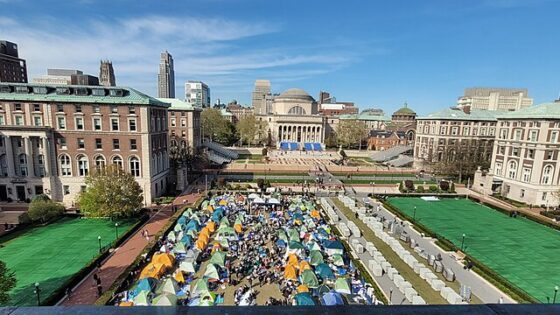The biography of Steven Rose, one of Britain’s preeminent scientists, includes an Orthodox Jewish upbringing, early memories of Holocaust survivors staying in his family’s home after World War II – and leadership of the current British boycott campaign against Israel. Rose, a neurobiologist famed for his discoveries in the cellular and molecular mechanisms of learning and memory, was elated last week. On May 29, Britain’s largest college teachers’ union passed a resolution urging British academics to boycott their Israeli counterparts. The 67,000-member National Association of Teachers in Further and Higher Education (NATFHE) approved a motion calling on its members to “consider their responsibilities” concerning the situation in Israel before working with Israeli academic institutions and colleagues. Among other things, the resolution urged members to work only with Israeli academics who “disassociated” themselves from the policies of their government. Strongly criticized by Israel’s supporters as mean-spirited, biased and even anti-Semitic – no other countries are boycotted in this way – the resolution was approved by a narrow margin. But Rose, 68, who teaches at the Open University in London, termed the outcome “a moral wake-up call” for union members. “It is about time that Israeli academic institutions speak out against the curfews and restrictions on the academic freedom of their Palestinian colleagues,” said Rose in an interview by phone with The Jewish Week. “Instead there is a resounding silence.” The resolution stressed “an institutional boycott, not one of individuals,” he said. “We will, of course, support [those protesting Israeli policies] in Israeli institutions.” Rose is, without a doubt, a powerful lightning rod for the controversial movement to isolate Israel as punishment for its occupation and settlement activities in the Palestinian-populated West Bank and – until recently – Gaza. Besides the recognition he has earned for his scientific work, the neurobiologist enjoys public prominence through his regular articles on public affairs in The Guardian; his role as a panelist on “The Moral Maze,” a BBC Radio program about ethics and science; and books and media appearances that popularize science for the masses. But it is his Jewish background that has provoked an especially vitriolic reaction in this campaign, he says. Most of the e-mails that inundated his computer were unflattering, he said. Many accused him of being a self-hating Jew. “This charge,” Rose stated, “is so intellectually contemptible as not to bear examination. It goes along with the hate-filled e-mails of such violent obscenity that I and others receive regularly that I continue to be shocked that rational people can behave in this way. I fully anticipate another such wave after this interview, but I am by now inured to it.” The son of a British Army volunteer who spent part of World War II stationed in pre-state Palestine, where he befriended Zionist settlers, Rose related that his early childhood included “the arrival at our home of some of our cousins who had survived the camps with brand-marks on their arms.” “Several members of my family emigrated to Israel in the years after ’48,” he related. “Like other Jewish children I was taught that Palestine was a land without people for a people without land.” It was on a visit to Israel several decades ago – he no longer remembers the year – that Rose’s political understanding of the situation in Israel began to change radically. “I knew about the Holocaust, but never about the Naqba,” he said, invoking the Arabic word for “catastrophe” used by the Palestinians to describe the flight, forced and otherwise, from their homes during the 1948 Israeli Independence War. Barred from returning, they have become the world’s longest unresolved refugee problem, now multiplied by several generations. On this visit to Israel, “I saw its meaning and its consequences with my own eyes,” Rose said. It was then that he became active in efforts to protest Israel’s policies in the West Bank and the Gaza Strip, the most recent of which was the academic boycott. Rose dismissed charges that singling out Israel, among all the countries in the world, for such treatment, constituted anti-Semitism. “Boycott is a particular form of non-violent action for civil society to take,” Rose said. “It is appropriate in the case of Israel, but it would be ludicrous to impose an academic boycott on the Sudan or Zimbabwe.” He added that he and other opponents of the Iraq war find other forms of protest activities against the U.S. and U.K. to be “more appropriate.” Furthermore, “Only extreme Zionists will conflate ‘Israel’ with ‘Jew,’” he said. “To criticize and take non-violent political action against Israeli state policies and institutions cannot be anti-Semitic any more than to have boycotted apartheid institutions was to have been ‘anti-South African’ or Nazi institutions to be ‘ anti-German.’” Rose’s penchant for raising Nazi Germany while talking about Israel came up again later during the interview when, pressed about the issue of academic freedom, he said, “Let me instead reply by analogy. In the 1930s, when Jewish academics were being expelled from German universities, should British academics have gone on working with their German colleagues as if this were a ‘normal’ academic discourse? “Of course,” he added, “I am not saying that Israel is like Nazi Germany, but I am saying that silence about injustice should not be a moral option.” The analogy to Nazi Germany infuriates NYU sociology professor Steven Lukes, who is critical of Israeli policies but finds the boycott dishonest. “If he doesn’t think there’s an analogy to Nazi Germany,” said Lukes, a former teacher at Oxford and a renowned scholar of political and social theory, “why does he make it? I think it’s disgraceful to make the analogy and then say you don’t think they are similar. Why say it in the first place?” A better analogy, Lukes said, would be apartheid-era South Africa, another regime to which Rose often compares Israel. Lukes described the academic boycott of Israel “morally and politically obtuse,” a “seriously misguided policy because it’s directed at completely the wrong target. You don’t attack academics for the crimes committed by their government.” The British boycott also attracted fire from traditionally pro-Israel circles. Professor Andrew Marks, chair of Columbia University’s department of physiology and cellular biophysics, as well as the president of an organization called International Academic Friends of Israel, called the boycott “dangerous.” He said it would not only hurt the academic community in Israel – responsible, he said, for many breakthroughs in medical science – but also contribute to a volatile global academic environment in which politics, not merit, set the tone. “If we are going to start using a political litmus test to decide who can participate in the world-wide academic community, as those promoting the boycott advocate, who is going to decide what the test will be and who will be targeted?” Marks asked. “Nothing good,” he added, “can come from this boycott. Importantly, it does not provide a pathway for peace in the Middle East nor will it benefit the Palestinians, many of whom depend on Israeli academics for opportunities to gain training.” The practical impact of the boycott, however, is dubious. This week NATFEH is joining another college teachers’ union, the Association of University Teachers, to form a third union, called the University and College Union. The AUT passed, earlier on this year, a similar resolution calling on its members to ban two Israeli universities, but had to retract the resolution in the face of massive pressure from academics the world over. Under the new union’s guidelines, NATFEH’s resolution would be considered a mere recommendation and will have no binding status. |
Israel’s Unlikeliest Critic: Steven Rose
The scientist behind the academic boycott in England grew up Orthodox with poignant memories of Holocaust survivors in his home.
- By Liel Leibovitz- Staff Writer
- June 9, 2006
Israel’s Unlikeliest Critic: Steven Rose
The scientist behind the academic boycott in England grew up Orthodox with poignant memories of Holocaust survivors in his home.




